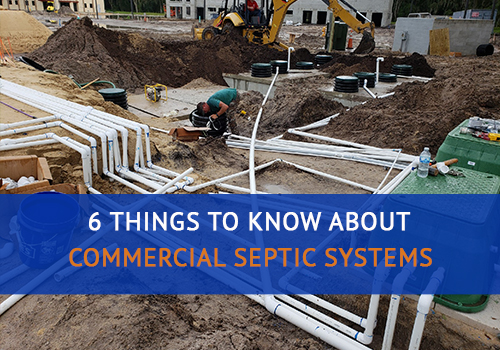Infrastructure is an essential part of any commercial property. However, we often don’t think about all of the planning that goes into a new restaurant or a local park — this includes commercial septic systems. Clean water and a fully functioning septic system are highly regulated with permits and requirements by the Florida Department of Environmental Protection and the Environmental Protection Program, including those with commercial systems.
If you already own commercial property, you are more than well aware of these requirements. However, what if this information is new for you or if you’re in the process of opening a new business? Let’s look at the things you should know about commercial septic systems.

6 Things to Know About Commercial Septic Systems & Properties
1. What is a Commercial Property?
Commercial property is different from residential property and used specifically for business and income purposes. These purposes could include,
- Apartment complexes
- Stores
- Hotels
- Manufacturing sites
- Offices
- Laundromat
If your property is used for anything other than private use, it’s considered commercial.
2. When You Need a Commercial Septic System
Septic systems are installed when there is no local municipal sewer system. Alternatively, a commercial septic system could be required when there is not a public system that can support the higher flow of a commercial property or business.
It’s important to remember that just because there is a public system in place, that doesn’t mean it’s ready to handle your commercial property. You know what they say when you assume…
3. How Commercial Septic Systems Differ from Residential Systems
A commercial septic system is not that different from a residential septic system, as the two operate in pretty much the same way. Solid waste is removed from the sewage water in a septic tank, while it undergoes natural bacterial breakdown. Then, it is released into a drain field to be filtered further and released back into the ground.
However, commercial septic systems are different in a few ways.
- Commercial septic systems see a higher volume of wastewater, which means that it requires a larger septic tank.
- Because of the large amount of sewage, cleaning and maintenance require different types of cleaners and equipment.
- Commercial properties produce various contaminants than residential properties, including fats, oils, and grease depending on what the property is used for.
- Septic tanks on commercial properties generally need to be pumped or serviced more frequently than residential properties. This is because the effluent entering the groundwater is higher than a private septic system. This prevents a commercial property from having a significant, negative impact on the local water source.
4. Installation Costs Can Vary on Commercial Septic Systems
Just like a residential septic system, there are many options for your septic system. These can include,
- Type of septic tank. This can include size, location, and material.
- Effluent standard. This refers to the amount of wastewater that a property produces. This can range drastically depending on the type of operating business.
- Ground Conditions. This is the size, layout, and materials on your property, like soil conditions, pre-existing ground contamination, water levels, and drainage to name a few.
5. Regular Maintenance is Fundamental
Commercial septic systems are large and produce more waste. Because of this, it is essential to schedule regular maintenance.
Sludge building up in a commercial septic tank happens more quickly than it does in a residential septic tank as it is used more frequently. Commercial septic owners should be aware of this, so they don’t run the risk of a broken septic tank or overused drain field. Environmental contamination from a commercial septic tank can severely impact the safety of local drinking water.
Every working part should be inspected consistently to ensure the longevity and efficiency of your commercial septic system.
6. Managing Water Usage is Important
You don’t want to inundate the system by using water frivolously. There are several ways that you can stay conscious of the water usage on your commercial property. Take a look at a few tips to see what you can do to minimize the wastewater output in your business.
- Watch for leaks and needed repairs so you can catch issues early on.
- Monitor the amount of water used in landscaping or irrigation.
- Invest in efficient toilets, urinals, and faucets. Is it time to update the bathrooms on your commercial property? Fixtures like low-flow toilets will significantly minimize the amount of used water.
- Educate employees or tenants. Letting those who use your commercial property the most about saving water can keep water costs and the amount of wastewater in your septic tank and drain field.
There are a lot of these to consider when installing or maintaining your commercial property. At Advanced Septic Services we can help you decide what’s best for you. Please don’t wait, give us a call today at (352) 242-6100.

